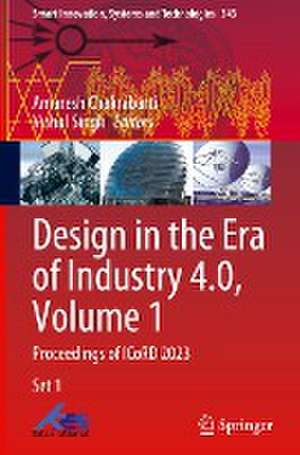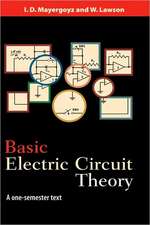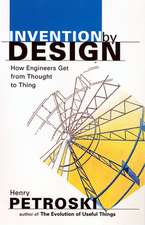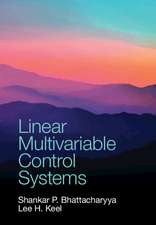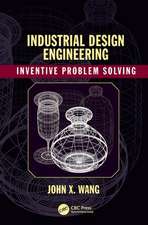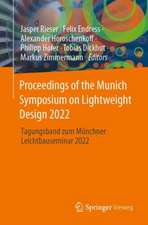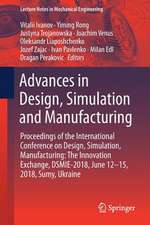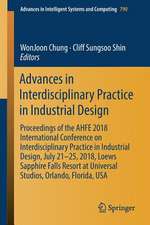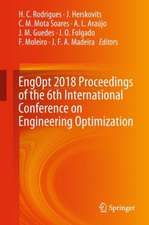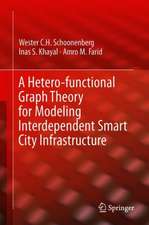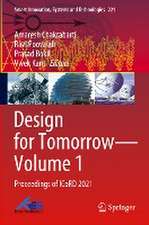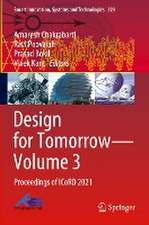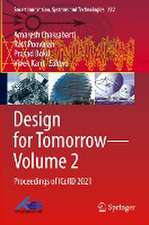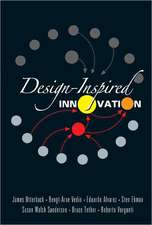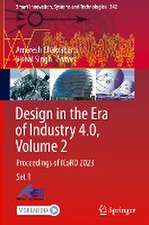Design in the Era of Industry 4.0, Volume 1: Proceedings of ICoRD 2023: Smart Innovation, Systems and Technologies, cartea 343
Editat de Amaresh Chakrabarti, Vishal Singhen Limba Engleză Hardback – 26 iul 2023
Din seria Smart Innovation, Systems and Technologies
- 20%
 Preț: 601.32 lei
Preț: 601.32 lei - 18%
 Preț: 1111.97 lei
Preț: 1111.97 lei - 18%
 Preț: 1861.27 lei
Preț: 1861.27 lei - 20%
 Preț: 760.64 lei
Preț: 760.64 lei - 18%
 Preț: 1903.86 lei
Preț: 1903.86 lei - 18%
 Preț: 1236.99 lei
Preț: 1236.99 lei - 20%
 Preț: 1721.69 lei
Preț: 1721.69 lei - 20%
 Preț: 1287.78 lei
Preț: 1287.78 lei - 20%
 Preț: 1749.74 lei
Preț: 1749.74 lei - 20%
 Preț: 2221.63 lei
Preț: 2221.63 lei - 18%
 Preț: 2520.23 lei
Preț: 2520.23 lei - 20%
 Preț: 1337.27 lei
Preț: 1337.27 lei - 18%
 Preț: 1557.39 lei
Preț: 1557.39 lei - 18%
 Preț: 1123.35 lei
Preț: 1123.35 lei - 18%
 Preț: 1393.09 lei
Preț: 1393.09 lei - 20%
 Preț: 1738.54 lei
Preț: 1738.54 lei - 20%
 Preț: 2205.12 lei
Preț: 2205.12 lei - 18%
 Preț: 1226.11 lei
Preț: 1226.11 lei - 20%
 Preț: 1300.14 lei
Preț: 1300.14 lei - 20%
 Preț: 931.84 lei
Preț: 931.84 lei - 20%
 Preț: 1933.71 lei
Preț: 1933.71 lei - 20%
 Preț: 1778.85 lei
Preț: 1778.85 lei - 18%
 Preț: 1117.99 lei
Preț: 1117.99 lei - 20%
 Preț: 1759.63 lei
Preț: 1759.63 lei - 18%
 Preț: 952.09 lei
Preț: 952.09 lei - 20%
 Preț: 1762.94 lei
Preț: 1762.94 lei - 18%
 Preț: 1383.00 lei
Preț: 1383.00 lei - 20%
 Preț: 1922.18 lei
Preț: 1922.18 lei - 20%
 Preț: 1623.53 lei
Preț: 1623.53 lei - 20%
 Preț: 1623.53 lei
Preț: 1623.53 lei - 20%
 Preț: 2210.06 lei
Preț: 2210.06 lei - 20%
 Preț: 1618.60 lei
Preț: 1618.60 lei - 20%
 Preț: 1312.52 lei
Preț: 1312.52 lei - 20%
 Preț: 1310.88 lei
Preț: 1310.88 lei - 20%
 Preț: 1753.06 lei
Preț: 1753.06 lei - 20%
 Preț: 1456.88 lei
Preț: 1456.88 lei - 20%
 Preț: 1464.33 lei
Preț: 1464.33 lei - 20%
 Preț: 1627.65 lei
Preț: 1627.65 lei - 20%
 Preț: 1463.49 lei
Preț: 1463.49 lei - 20%
 Preț: 1923.82 lei
Preț: 1923.82 lei -
 Preț: 436.35 lei
Preț: 436.35 lei - 15%
 Preț: 641.71 lei
Preț: 641.71 lei - 18%
 Preț: 1413.76 lei
Preț: 1413.76 lei - 20%
 Preț: 1781.21 lei
Preț: 1781.21 lei - 20%
 Preț: 1756.37 lei
Preț: 1756.37 lei - 20%
 Preț: 1756.37 lei
Preț: 1756.37 lei - 20%
 Preț: 1634.59 lei
Preț: 1634.59 lei - 18%
 Preț: 1124.92 lei
Preț: 1124.92 lei
Preț: 1907.60 lei
Preț vechi: 2509.99 lei
-24% Nou
Puncte Express: 2861
Preț estimativ în valută:
365.07€ • 379.73$ • 301.38£
365.07€ • 379.73$ • 301.38£
Carte tipărită la comandă
Livrare economică 11-17 aprilie
Preluare comenzi: 021 569.72.76
Specificații
ISBN-13: 9789819902927
ISBN-10: 9819902924
Pagini: 1261
Ilustrații: XXXIV, 1261 p. 580 illus., 475 illus. in color. In 2 volumes, not available separately.
Dimensiuni: 155 x 235 mm
Ediția:1st ed. 2023
Editura: Springer Nature Singapore
Colecția Springer
Seria Smart Innovation, Systems and Technologies
Locul publicării:Singapore, Singapore
ISBN-10: 9819902924
Pagini: 1261
Ilustrații: XXXIV, 1261 p. 580 illus., 475 illus. in color. In 2 volumes, not available separately.
Dimensiuni: 155 x 235 mm
Ediția:1st ed. 2023
Editura: Springer Nature Singapore
Colecția Springer
Seria Smart Innovation, Systems and Technologies
Locul publicării:Singapore, Singapore
Cuprins
PART I: Human Factors in Design (Physical and Cognitive Ergonomics; Design for Emotions, etc.).- 1. Influence and Depiction of Power in an Urban Space.- 2. Modular Approaches & Perspectives in Temple Architecture.- 3. Store Atmospherics and Moderating Effect of Motives on Consumer Behaviour- An Indian Perspective.- 4. Ergonomic Assessment and Workstation Design for Women Workers in Cashew Factory.- 5. Exploring Architectural façade characteristics of Bag Bazar Street, Kolkata.- 6. The Role of Awareness and Experience in Designing Social Inclusion.- 7. Preconditioning pre-adolescent students to cope with academic stress: Using game design as an approach to inculcate healthy coping mechanisms.- 8. An empirical study to improve faculty workplace ergonomics for minimizing the risk of transmission of airborne diseases.- 9. Identification of Appropriate Tools and Techniques for Ergonomic Evaluation in FMCG Industrial Shop Floor.- 10. OSH risk perception of floating solar PV workers and identifying scope for design interventions: A co-design approach. etc.
Notă biografică
Amaresh Chakrabarti is Senior Professor and current Chairman for the Centre for Product Design & Manufacturing, Indian Institute of Science (IISc), Bangalore. He has B.E. in Mechanical Engineering from Indian Institute of Engineering Science and Technology, Shibpur, M.E. in Design of Mechanical Systems from Indian Institute of Science, Bengaluru, and Ph.D. in Engineering Design from the University of Cambridge UK. He led for ten years the Design Synthesis group at the EPSRC funded Centre of Excellence called the Engineering Design Centre at University of Cambridge before joining Indian Institute of Science as Associate Professor in 2001. His interests are in synthesis, creativity, sustainability, and informatics. He published 16 books, over 300 peer-reviewed articles, and has 11 patents granted/pending. He co-authored DRM, a methodology used widely as framework for design research. He has been Associate Editor, AI EDAM & Design Science Journal (Cambridge University Press), Area Editor, Research in Engineering Design, Regional Editor, Journal of Re-manufacturing (Springer), and Advisory Editor for eight Journals including Clean Technologies & Environmental Policy (Springer), and Journal of Engineering Design and International Journal of Design Creativity & Innovation (Taylor & Francis). He has been on the Advisory Board and the Board of Management of the Design Society, UK; Member of the CII National Committee on Design India; Member of the Jury of India Design Mark; and Member of the CII Smart Manufacturing Council India. He founded IDeASLab – India's first Design Observatory. He is Founding Programme Chair for International Conference Series on Research into Design (ICoRD), Conference Chair for the 22nd CIRP Design Conference 2012 and the 3rd International Conference on Design Creativity 2015 (3rd ICDC), and Vice-Chair for AI in Design and Design Computing & Cognition Conferences. He is Honorary Fellow of the Institution of Engineering Designers, the highest honour of the peer society under the UK Royal Charter in engineering design, and TUM Ambassador Awardee from TU Munich Germany. Sixteen of his papers won top paper awards in international conferences. In 2014, he co-initiated India's first Smart Factory R&D platform. He also heads the IISc-TCS Innovation Lab, the IISc Press, and the Springer International Book Series on Design Science & Innovation. He has received Careers360 Faculty Research Award 2018 for being the 'Most Outstanding Researcher' in Decision Sciences. He is the current Editor-in-Chief for AI EDAM Journal (CUP).
Vishal Singh is Associate Professor in the Centre for Product Design and Manufacturing at IISc. Before joining IISc, he was Assistant Professor in the Department of Civil Engineering at Aalto University, Finland, besides a brief stint as Director, Innovation at the Helsinki Metropolia University of Applied Sciences where he led the Research & Development strategy for the Data-Driven Construction Innovation Hub. At Aalto, Vishal led the Aalto BIM Collaboration and built the Integrated Construction Innovation and Collaboration (ICONIC) Lab focusing on construction informatics and Building Information Modelling (BIM). Previously, he has also worked in Australia as Postdoctoral Research Fellow at Deakin University and as Research Assistant at the University of Newcastle. His research and teaching have revolved around digitalisation and construction informatics, looking at the products, processes, people, and policy aspects of Building Information Modelling (BIM) and Product Lifecycle Management (PLM) approaches, complemented by his research on design and construction innovation. His research builds on design thinking, computational thinking, and systems thinking to understand and develop tools and methods to study built environment innovation ecosystems, ranging from micro-ecosystems within project teams to macro-ecosystems at the urban and global levels. He also serves on the scientific committee of several international conference series across engineering design, product informatics, and lifecycle management. He has also served as Chair of the Educational Committee in EC3, the European Council for Computing in Construction. He has also been Regular Contributor and Reviewer across several noted academic journals.
Vishal Singh is Associate Professor in the Centre for Product Design and Manufacturing at IISc. Before joining IISc, he was Assistant Professor in the Department of Civil Engineering at Aalto University, Finland, besides a brief stint as Director, Innovation at the Helsinki Metropolia University of Applied Sciences where he led the Research & Development strategy for the Data-Driven Construction Innovation Hub. At Aalto, Vishal led the Aalto BIM Collaboration and built the Integrated Construction Innovation and Collaboration (ICONIC) Lab focusing on construction informatics and Building Information Modelling (BIM). Previously, he has also worked in Australia as Postdoctoral Research Fellow at Deakin University and as Research Assistant at the University of Newcastle. His research and teaching have revolved around digitalisation and construction informatics, looking at the products, processes, people, and policy aspects of Building Information Modelling (BIM) and Product Lifecycle Management (PLM) approaches, complemented by his research on design and construction innovation. His research builds on design thinking, computational thinking, and systems thinking to understand and develop tools and methods to study built environment innovation ecosystems, ranging from micro-ecosystems within project teams to macro-ecosystems at the urban and global levels. He also serves on the scientific committee of several international conference series across engineering design, product informatics, and lifecycle management. He has also served as Chair of the Educational Committee in EC3, the European Council for Computing in Construction. He has also been Regular Contributor and Reviewer across several noted academic journals.
Textul de pe ultima copertă
This book showcases cutting-edge research papers from the 9th International Conference on Research into Design (ICoRD 2023) – the largest in India in this area – written by eminent researchers from across the world on design processes, technologies, methods and tools, and their impact on innovation, for supporting design for a connected world. The theme of ICoRD'23 has been ‘Design in the Era of Industry 4.0’. Industry 4.0 signifies the fourth industrial revolution. The first industrial revolution was driven by the introduction of mechanical power such as steam and water engines to replace human and animal labour. The second industrial revolution involved introduction of electrical power and organised labour. The third industrial revolution was powered by introduction of industrial automation. The fourth industrial revolution involves introduction of a combination of technologies to enable connected intelligence and industrial autonomy. The introduction of Industry 4.0 dramaticallychanges the landscape of innovation, and the way design, the engine of innovation, is carried out. The theme of ICoRD'23 - ‘Design in the Era of Industry 4.0’ –explores how Industry 4.0 concepts and technologies influence the way design is conducted, and how methods, tools, and approaches for supporting design can take advantage of this transformational change that is sweeping across the world. The book is of interest to researchers, professionals, and entrepreneurs working in the areas on industrial design, manufacturing, consumer goods, and industrial management who are interested in the new and emerging methods and tools for design of new products, systems, and services.
Caracteristici
Showcases cutting-edge research papers from the 9th International Conference on Research into Design (ICoRD 2023) Emphasizes on Industry 4.0 which signifies the fourth industrial revolution Benefits researchers, professionals, and entrepreneurs working in the areas on industrial design
